Remember the three Malaysians who went on an epic 3,000km road trip through India in a tiny, rickety auto rickshaw? Well Johann, Nessa and Hafiz – the three sorta out-of-work 20-somethings who made up Team Jenggols – are back home. And they have stories to tell.
Two months ago, as we interviewed them in a nice café in Sri Hartamas, it was hard to imagine these three fellows would submit themselves to a grueling trip where getting lost, getting stuck and breaking down is expected. But they did and on the queue of bragging rights is one heckuva story!
As we settled down for the interview recently (again in a nice café in Sri Hartamas) the first story Hafiz tells was of Nessa falling out of the rickshaw…while they were driving down a major highway…against the flow of traffic.
That turned out to be just the FIRST shot, from what would be a blitz of stories.
Now, how do you tell the story of their entire 3,000km adventure (and they did this in aid of a charity organisation called Cool Earth, which works alongside indigenous villages to halt rainforest destruction) in a 2,000 word article? Since theirs was an epic roller-coaster of crazy adventures and self-discovery, a mere article would not do it justice. So we’ll just have to settle for some highlights.
The trio arrived at their hotel in Kochi, Kerala — the starting point of the journey, in late December and just spent a week getting used to the local conditions. Johann, Nessa and Hafiz soon discovered that prejudices about Indian hygiene, crime and society in general are seriously misplaced.
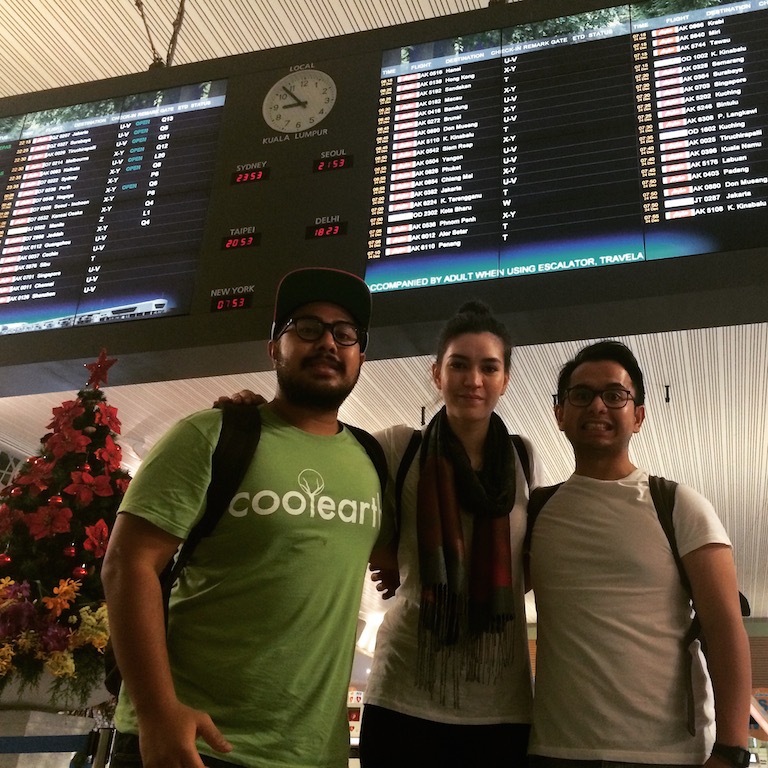
Before the big adventure
“It’s not too bad,” says Johann, “It’s not much worse than what we are used to in Malaysia. Bottled water is available everywhere and it’s really cheap. And the food was fine.”
With those initial worries out of the way, they quickly made friends with the hotel owner and his family. The next few days were spent just relaxing and playing football with the local kids. To their surprise (this would be the first of many pleasant culture shocks in their journey), there would be 3 or 4 games going on at the same time, on the same field!
With the football gang
Kids would be playing cricket, football and whatever other games side by side and there would be no confusion or fighting over who had which part of the field. All the kids cheerfully shared the space, and there was “no tension” (that would be the phrase they kept hearing throughout their journey) about it.
This would be the first of many events that made the guys question the urbanised, consumer-driven culture we’re so used to. As Johann enthusiastically described the scene, “At home, we’d see big kids chasing off the smaller kids, or people would claim the right to exclusively use a field. But these kids were all happily playing together.”
Hafiz chimes in, “Yeah, there was no argument about who was getting in whose way. If a football was kicked into the cricket game, they would just kick it back and carry on. It was cool!”
So the first few days in Kochi passed idyllically for the guys, as they took in the sights and sounds of India. But as Race Day got under way, it finally dawned on the guys that they were woefully unprepared.
Murphy’s Law kicked in almost immediately after they started on the journey. All hopes of travelling their scheduled 200km a day came crashing down as “Appu” (the name they gave their rickshaw, in honour of a kid they befriended in Kochi – it’s kind of a long story) broke down more than 20 times on the first day itself.

The legendary ‘Appu’
The tension started to pile up as their rickshaw’s tiny engine would lose power and die after only about 10 minutes of sputtering travel. And they had to spend another 5-10 minutes yanking the starter rope (yup, just like a lawnmower) to get it running again.
After a long and frustrating day, a local mechanic finally found the problem. A tiny bit of lint had gotten trapped in the fuel intake – a result of Johann’s slightly less-than-perfect fuelling up operation at the start of the journey.
But they quickly learned to adapt to the trip’s unpredictable conditions. And the next two weeks quickly fell into a predictable routine – wake up at dawn, drive until evening, look for accommodation, sleep, repeat. Of course, this routine was peppered with minor crises, interesting discoveries and the occasional awe-inspiring moment.
Johann shares about the time they were traversing the golden dunes of the great Rajasthan desert towards the end point of Jaisalmer city. As they rested for the night, they looked up into the sky and saw the most incredible display of stars – like fistfuls of glitter thrown across a vast expanse of black velvet.
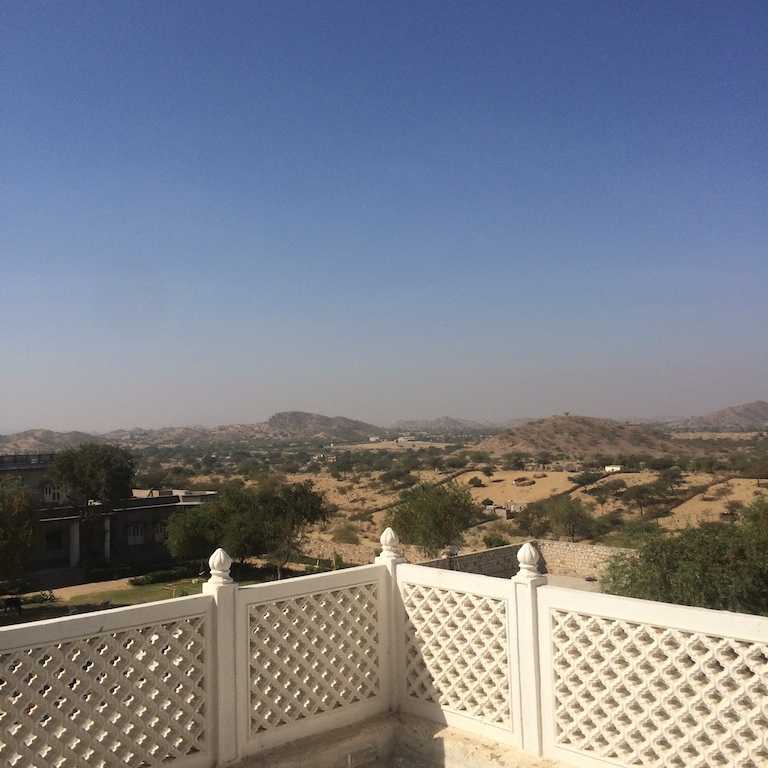
Jaisalmer: An awesome hotel in the middle of the desert
“It’s like nothing we’ve ever seen at home,” says Johann. It was one of those moments that humbles the soul, when one realises how small we are compared to the greatness of the universe.
Another awe-inspiring moment came when they visited the Taj Mahal. At first they were wary of all the tourist hustling and the guys were half-expecting the greatest monument of love to have been overhyped by tourism propaganda. But as they approached the structure, they were literally struck speechless.
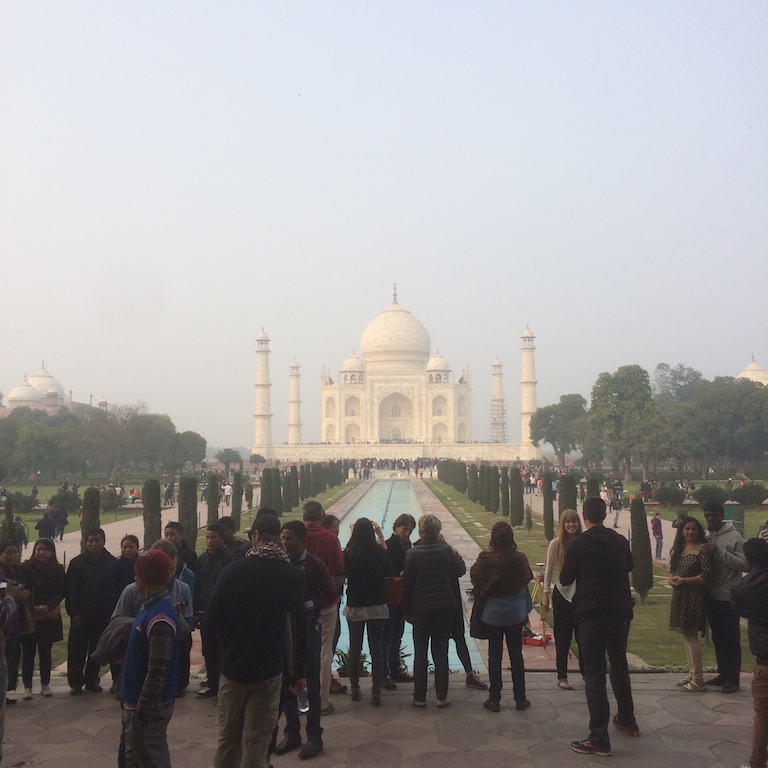
“The Taj is too beautful even on a foggy day” — Team Jenggols
“We were just in absolute awe of the Taj Mahal’s majesty,” says Nessa.
“It adds a new perspective on life,” says Johann, “Modern technology has advanced so much, but does our modern world have any achievements that would last hundreds of years?”
Besides the breath-taking moments, there were also the funny moments. Communication turned out to a slight problem in some places, especially the rural areas. And this created plenty of opportunities for some impromptu comedy.
At one point they had a busted tyre in the middle of nowhere. Thankfully, there was a tyre shop nearby. So Nessa rushes over and tells them, “Excuse me, sir. We need change the tyre.” But all she got were blank stares.
But in a scene straight out of a sitcom, Hafiz figured out a way to communicate. He coolly tells the shop owners, “Tyre, change!” in a thick Indian accent. And the tyre shop guys immediately got the message and got the job done.
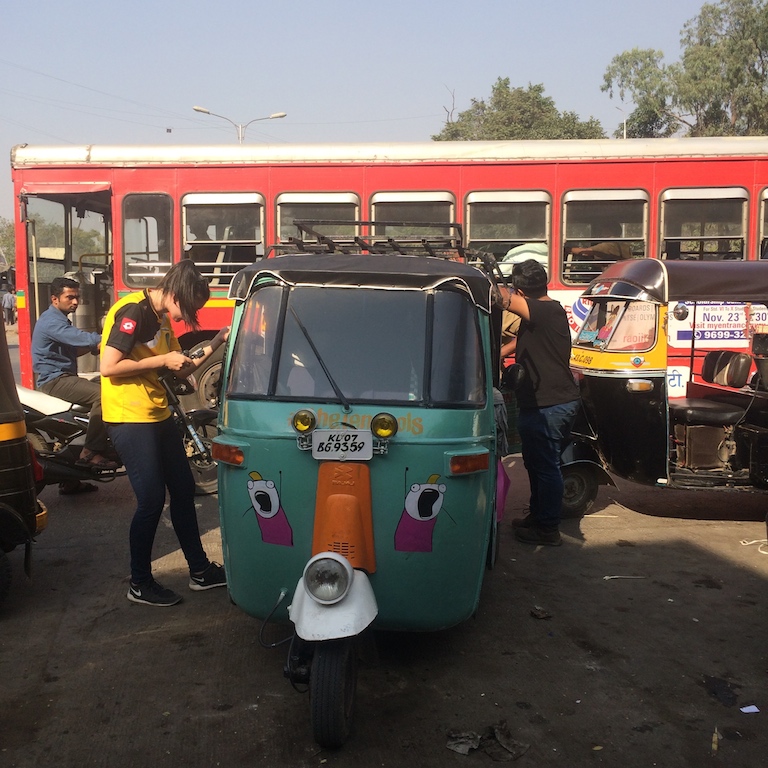
Breakdown (again)!
Since that incident, Hafiz became the communication expert – which basically meant speaking in English with an Indian accent. And they found that most of the time, it really worked!
The sight of a white girl driving a couple of Asian drew stares wherever they went. Our friends eventually got used to the puzzled stares.
Another thing that struck our adventurers was the fact the Indians’ strong sense of national pride. The “My India” concept kept popping up.
The Indians seemed eager to give foreigners the best possible experience of their country, either from offering their friendship, help or hospitality. People would go out of their way to help our guys and refuse any money, saying “No tension, it’s My India!”
“We were randomly invited onto the podium with the head honchos at a beach soccer final”.
Some of the other teams got invited to birthday parties and weddings. One team even got invited to tea at the local police commissioner’s house. They ended up spending the night there.
“It’s very refreshing compared to the individualistic societies we’re used to,” says Johann.
Another pleasant surprise during their journey was when curious locals strike up a conversation. Invariably, they would take great pleasure in pointing out on a map where they’re from. Because hey, “It’s My India!” And when they find out where our friends were from, many would give a wide-eyed response of “Malaysia, yeah – truly Asia!” – even when they don’t know anything else about the country. (Dang! Good job, Tourism Malaysia!)
Of course, there were some harrowing moments. Like the time the hotel they were staying in was raided by cops. Only, they weren’t looking for hookers or drugs. They were checking for terrorist activities. Being foreigners with Muslim names, it was a little hairy for a while, but it was all sorted out in the end.
And then there were all the amazing people they met during the journey. Like the team of two 50-year-old Czechs who decided to go on this adventure as they figured out the next phase of their lives. Or the Brit who came to India to get his teeth fixed because he didn’t get any respect from dentists the UK. Or the Canadian Indian who travelled to Kochi every year to spend winters there.
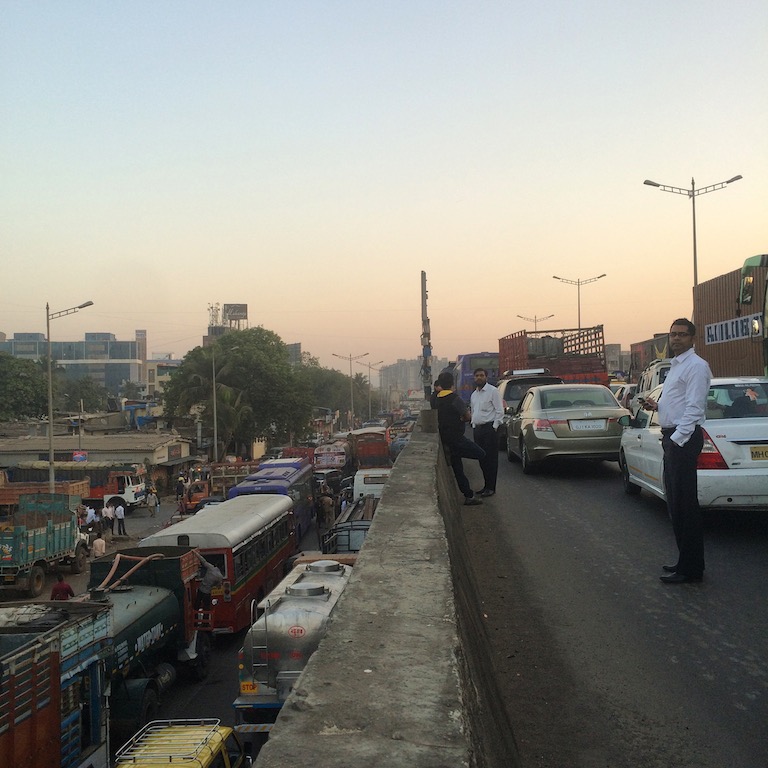
Literal standstill during a traffic jam
As the trio returned to Malaysia, it took some time to get used to the modern lifestyle again. A 200km journey no longer took a bone-shaking 10 hours. As they got used to the air-conditioned comfort of a car, they also realised that it would only take them a couple of hours.
So what was their biggest takeaway from this trip?
“For me, I’m definitely more thankful for the comforts of life,” says Johann, “We met so many Indians whose families had to survive on less than RM3 a day, but were still happy and content.”
“I also learnt how to be more resourceful. A lot of the time, whether something is able to be done or not depends on our own determination to do it,” he further explains. “I’m a task-oriented person but I’ve also learnt to discern what’s more important – relationships or outcomes. It’s not worth sacrificing one for the other and this perspective is important in my work.”
For Hafiz, he’s learnt to look at things with some perspective.
“I’ve learnt to be more laidback, less forceful, more accepting,” he explains. “During the journey, so many things would break down and our plans get messed up. But for our own sanity, we learnt to just wait and see if something better comes up a little further down the road. And usually it does.”
Nessa has learnt to appreciate simple things in life, like soap and running water, because it was so rare to get that during their long journey.

“Even the produce in India looks amazing”
Most of all, our friends were touched by the Indian people — the locals seemed to lead such simple lifestyles and find such joy and happiness in the simplest things. To borrow a cliché, there seems to be a certain vibe or energy in the land, they felt. More spiritual, more communal. It was refreshing for them to be immersed in a people who were not (yet) caught up in a materialistic culture.

“Thank you, India, for an amazing month” — Team Jenggols
“India is an amazing place, but you have to experience it for yourself,” says Johann. “Don’t take the tourist trap routes. Take time to really explore the country and meet the people.”
Know about something happening in KL and Malaysia? Want to share? Send us an email: kl@coconuts.co – don’t just read the news, make it!
Don’t miss these hits on Coconuts KL:
READ: Want to make a difference? Read what these change makers did to do something good
READ: Six Chinese dishes that were actually created in Malaysia
READ: Once upon a time in KL: A pictorial collection on Vintage KL
SPOTLIGHT: Kampung Baru and the price of development
READ: 10 English words that have been completely bastardised by Malaysians
Top 10 things to do in Penang
Exploring Bangkok’s abandoned I.C Tower
Kampung Buangkok: The last village in Singapore
Get Coconuts news delivered to your inbox! Subscribe to our newsletter below for a chance to win a limited edition Coconuts hat.
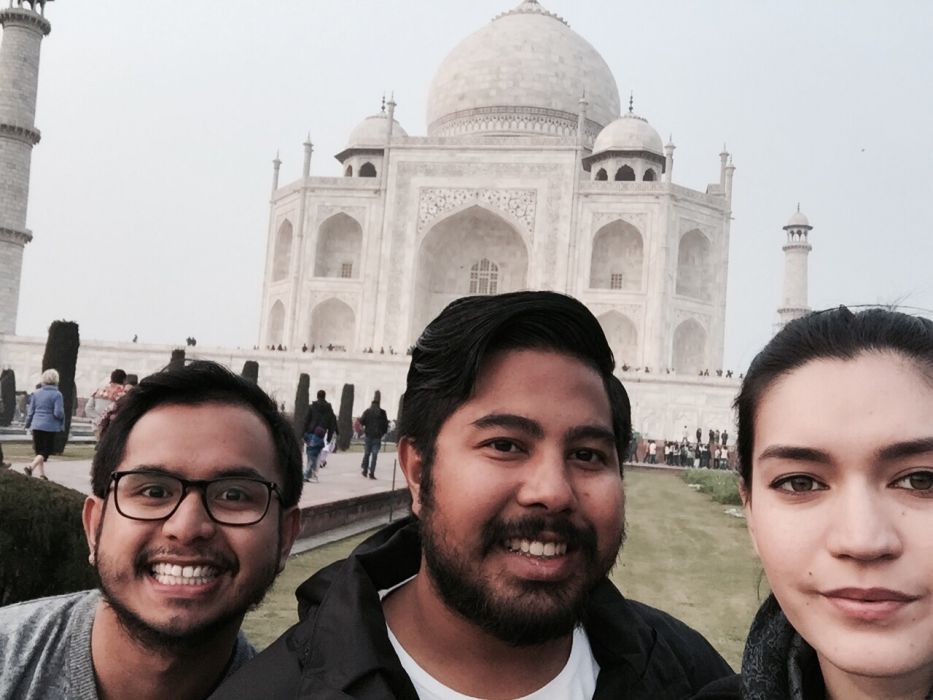


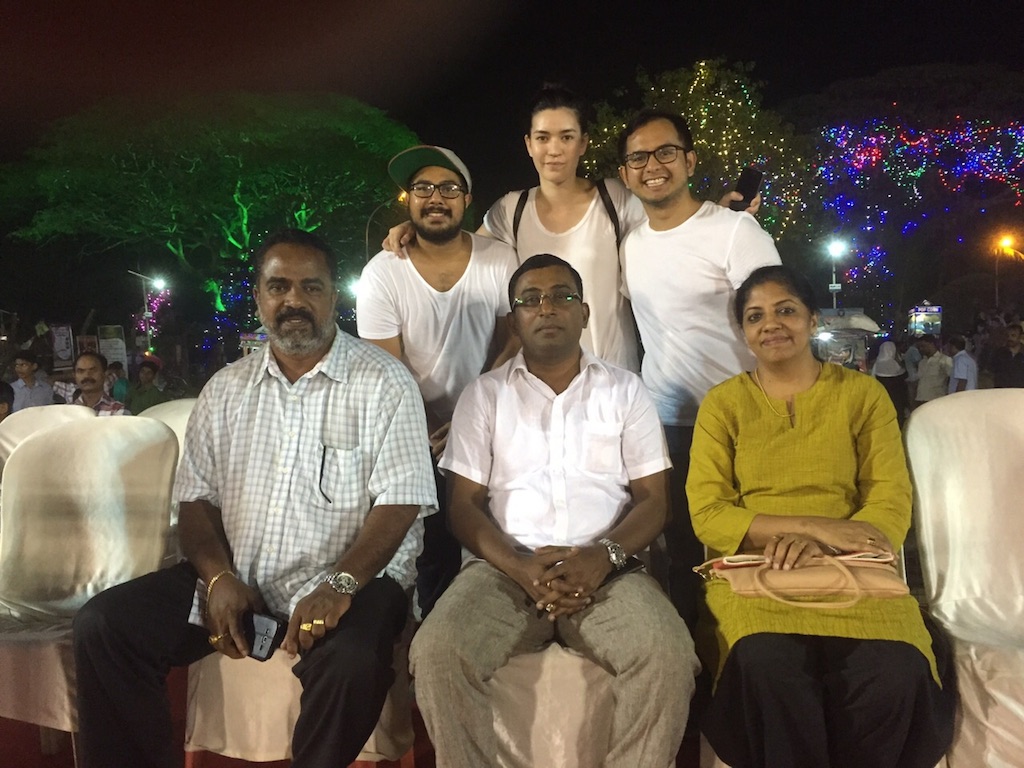



Reader Interactions